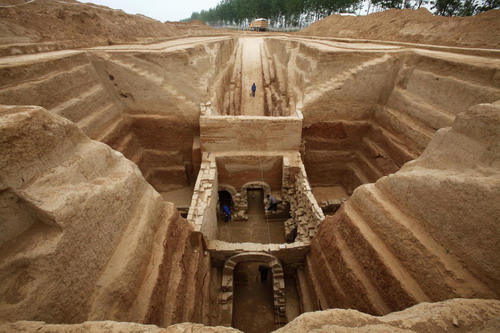Ancient general's tomb unearthed in Henan
(chinadaily.com.cn/Xinhua) Updated: 2010-05-18 11:54
Archeologists in central China's Henan Province say they have found the tomb of a noted general from the Three Kingdoms period (220-280 AD).
The tomb of Cao Xiu was found in Mengjin County of Luoyang City at the end of last year, said Sun Yingmin, spokesman of the Henan provincial cultural heritage bureau, at a press conference Monday.
The tomb, 50 meters long and 21 meters wide, held chinaware, copperware, liquor cups, and jars as well as some human bones, said Sun.
Tests suggested the bones belonged to a 50-year-old man and a 40-year-old woman, he said.
A bronze seal, about the size of a coin and engraved with Cao Xiu's name revealed the tomb owner's identity, he added.
|
||||
The tomb was similar to that of Cao Cao, found in Anyang City, of Henan Province, in December, said Sun.
History books say Cao Cao took Cao Xiu as a son, though the two were not blood relations.
The discovery of Cao Cao's tomb was listed as one of China's greatest archaeological achievements last year. However, it triggered skepticism from scholars and Internet commentators who questioned its authenticity.
Experts from Shanghai's Fudan University are trying to get DNA from Cao's descendants and compare it with the DNA extracted from a skull uncovered in the tomb.
Cao Cao (155-220 AD), who built the strongest and most prosperous state during the Three Kingdoms period (208-280 AD), is remembered for his outstanding military and political talents.
- 'Cooperation is complementary'
- Worldwide manhunt nets 50th fugitive
- China-Japan meet seeks cooperation
- Agency ensuring natural gas supply
- Global manhunt sees China catch its 50th fugitive
- Call for 'Red Boat Spirit' a noble goal, official says
- China 'open to world' of foreign talent
- Free trade studies agreed on as Li meets with Canadian PM Trudeau
- Emojis on austerity rules from top anti-graft authority go viral
- Xi: All aboard internet express
















